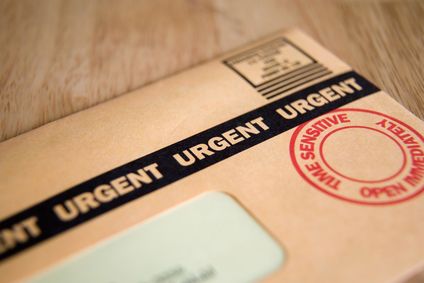 A class action lawsuit filed Tuesday in the Eastern District of New York accuses debt collection agency I.C. System Inc. of using “unfair and unconscionable” debt collection practices that violate the privacy of consumers
A class action lawsuit filed Tuesday in the Eastern District of New York accuses debt collection agency I.C. System Inc. of using “unfair and unconscionable” debt collection practices that violate the privacy of consumers
New York resident Tolzoh Katzburg alleges in the FDCPA lawsuit, filed Feb. 17, that Minnesota-based I.C. System violated the Fair Debt Collection Practices Act (FDCPA) by sending him a debt collection letter in an envelope which contained a glassine window. Katzburg’s reference number for the alleged debt, assigned by I.C. System, was visible through the window of the envelope, above his name and address.
This violated Katzburg’s privacy, the I.C. System class action lawsuit says, because, “The reference number, when disclosed in the public eye, exposes the consumer’s financial quandry.”
The FDCPA prohibits debt collectors from sending collection letters to consumers which reveal information other than the name and address of the collection agency.
Katzburg is seeking to represent all New York residents who were sent an I.C. System collection letter in substantially the same form letter that he received; and the collection letter was sent to seek payment of a personal debt purportedly owed to Xchange Telecom.
Katzburg is asking for statutory and actual damages for the proposed Class as provided under the FDCPA.
The I.C. System FDCPA Class Action Lawsuit is Katzburg v. I.C. System Inc., Case No. 15-cv-00811-ENV-LB., U.S. District Court, Eastern District of New York.
What is the the Fair Debt Collection Practices Act?
The Federal Trade Commission (FTC) enforces the Fair Debt Collection Practices Act (FDCPA), which prohibits debt collectors from using abusive, unfair, or deceptive practices to collect from consumers.
Under the FDCPA, a debt collector is someone who regularly collects debts owed to others. This includes collection agencies, lawyers who collect debts on a regular basis, and companies that buy delinquent debts and then try to collect them. [Source: FTC]
The FDCPA offers consumers a number of rights and prohibits some of the following unfair and abusive debt collection practices:
- False statements and deceptive practices
- Threats of lawsuits or arrest
- Abusive language
- Threatening or deceptive letters
- Telephone calls early in the morning or late at night
- Robocalls to your cell phone
- Communicating with third parties about your debt
- Collection of expired debts
- Attempts to collect debt that has already been discharged or settled
- Attempts to collect a debt you do not owe
- Improper debt collection after bankruptcy
- Failing to cease communications upon a written request to do so
- Reporting false information on your credit report
Recourse for FDCPA Violations
You have the right to sue a collector in a state or federal court within one year from the date the law was violated. If you win the FDCPA lawsuit, the judge can require the collector to pay you any actual damages that you can prove you suffered because of the illegal debt collection practices, such as lost wages and medical bills.
Even if you can’t prove that you suffered actual damages, the judge can require the debt collector to pay you up to $1,000. You may also be reimbursed for attorneys’ fees and court costs.
If a group of people suffered the same FDCPA violations at the hands of a single company, they may join together and sue the debt collector as part of a class action lawsuit and recover damages of up to $500,000, or one percent of the collector’s net worth, whichever amount is lower.
Keep in mind that even if a debt collector is found to have violated the FDCPA, you still have to pay the debt if you owe it.
Join a Free Unfair Debt Collection Class Action Lawsuit Investigation
If a lender or debt collector engaged in unfair debt collection practices, you may have a legal claim and could be owed compensation for violations of the Fair Debt Collection Practices Act (FDCPA).
DISCLAIMER: Debt collection itself is not illegal. However, debt collection firms collecting on consumer debts must adhere to the FDCPA. Even though debt attorneys are investigating these companies, their debt collection practices may be legal.
ATTORNEY ADVERTISING
Top Class Actions is a Proud Member of the American Bar Association
LEGAL INFORMATION IS NOT LEGAL ADVICE
Top Class Actions Legal Statement
©2008 – 2026 Top Class Actions® LLC
Various Trademarks held by their respective owners
This website is not intended for viewing or usage by European Union citizens.














